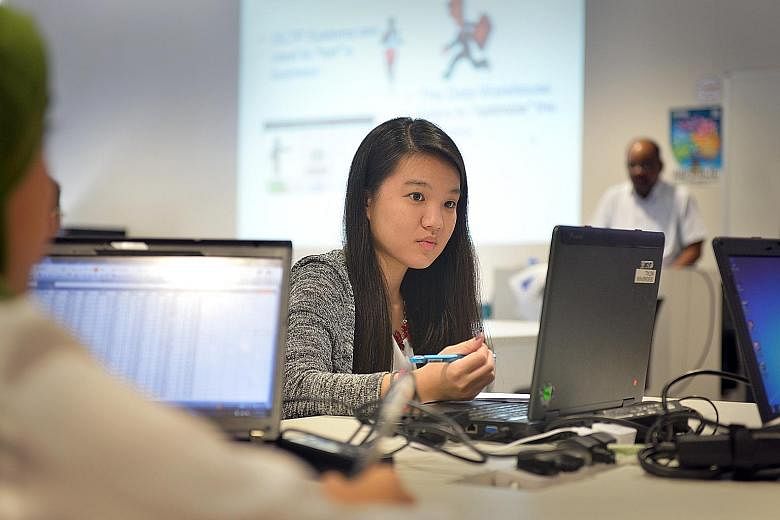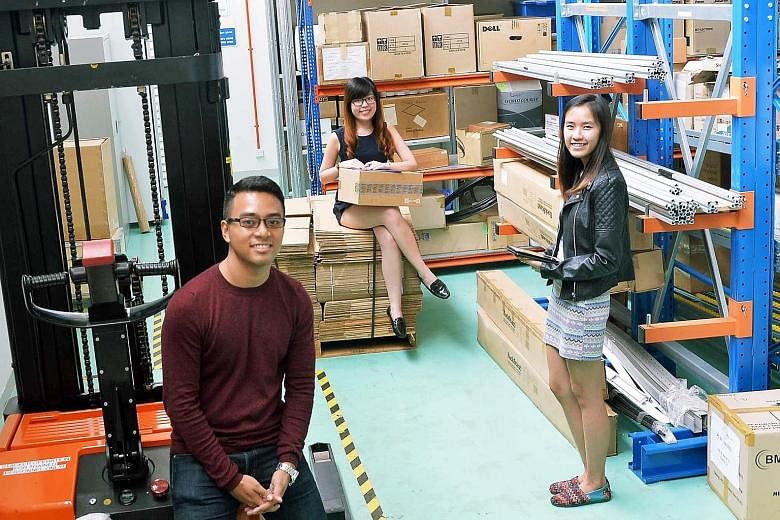One year after it was unveiled, a national movement to get Singaporeans to focus not just on getting the right paper qualifications, but also deep skills and on-the-job experience is slowly gaining momentum.
The Government's SkillsFuture drive was started last year to provide Singaporeans with opportunities, or pathways, to develop themselves to their fullest potential throughout life, regardless of where they started from.
A range of initiatives aimed at fostering mastery of skills and lifelong learning was introduced under that umbrella. These included the Earn and Learn scheme, for fresh polytechnic and Institute of Technical Education (ITE) graduates to work and gain qualifications at the same time, and the SkillsFuture Study Awards, handed out to young and mid-career workers looking to upgrade their skills.
Responding to queries by The Straits Times, the SkillsFuture Secretariat said the roll-out of initiatives under the movement is on track.
However, the success of SkillsFuture hinges on commitment from all stakeholders, including parents, teachers and employers, the secretariat added, noting: "SkillsFuture is a long-term, ongoing journey that will take time. Over time, as more employers recognise the importance of investing in their workers, and the benefits of recognising skills, others will also be encouraged to come on board.
"At the same time, Singaporeans must also look beyond the paper qualifications they or others start with when they join the workforce, and should continually seek mastery of skills in their fields."
But while educational institutions are steaming ahead, employers, and even parents and students, are only starting to warm up to the national effort.
Academics and recruitment experts consider it unrealistic to expect employers to shift from fixating on academic qualifications to embracing the importance of skills in such a short period of time.
"Just do a random search on any job board. The first line under requirements is qualifications, and many require a diploma or degree," noted Mr Adrian Tan, career coach at CareerLadder, a career guidance firm.
He said it is still early days to see a sweeping change of mindset, and suggested that big players, such as the civil service, take the lead.
There are some industries, however, such as technology and services, that recognise the importance of upskilling their workers.
The hotel industry, for instance, became the first sector last month to get a dedicated five-year manpower plan under the national drive. The plan outlines five measures to upgrade and retain workers in the industry, a framework of the new skills needed, and opportunities for career progression.
The strategy is important, with the number of hotel rooms due to increase by 20 per cent by 2020, boosting demand for workers. But the ageing workforce, coupled with tight foreign worker inflows, means the supply of rank-and-file workers will grow at a slower rate.
This is where SkillsFuture comes in, said Mr Timolty Chai, senior consultant at Careerhub Consultants. He said: "With the labour crunch affecting many industries, employers are able to use it to develop the skills of current employees."
More employers should realise how it could benefit them, said experts.
Noted Dr Timothy Chan, director of SIM Global Education's academic division: "We need to see more employers come on board to offer training places, and more government agencies to take the lead in changing some of their current recruitment practices to align with SkillsFuture."
The most obvious progress towards the national effort is, not surprisingly, in the academic institutions, which have become more attuned to the needs of employers.
"Institutions are making changes to their curriculum structure, teaching and assessment methods to accommodate internships and other skills-based learning," said Dr Chan.
More institutions, from schools to universities, are stepping up efforts to get students ready for the working world.
The five polytechnics and the ITE have, in the past year, embarked on various initiatives, and will be rolling out more.
One of them, Earn and Learn, is gaining traction among students. Launched in March by the Singapore Workforce Development Agency (WDA), it has begun in eight sectors, including food manufacturing and logistics, and will start in four more - construction, public transport, power and precision engineering - by March next year.
According to WDA, more than 250 polytechnic and ITE students and graduates have applied for the scheme, and more than 120 had been hired by some 50 firms in nine sectors as at end-September. The remaining applicants have not been placed because they are still studying or doing their national service.
WDA said it is on track to achieve its target of between 100 and 150 placements this year.
Over 12 to 18 months, participants get job training, work on projects or even go on overseas attachments.
Earn and Learn participants are paid around $2,000 a month while trying out various roles in their chosen fields. They may work for four days and devote one day to studies.
At the end of the programme, an ITE graduate gets a diploma and a polytechnic graduate gets an advanced or specialist diploma.
The first batch of 39 polytechnic graduates on the Earn and Learn logistics programme started classes at Republic Polytechnic (RP) last month. The 12-month programme leads to a specialist diploma in supply chain management. The participants receive training at one of 15 logistics firms, including DHL Supply Chain Singapore and ST Logistics. The monthly pay of $1,800 to $2,000 matches that of a polytechnic graduate who is starting work.
Among the participants is Ms Nerine Chua, who graduated with a diploma in supply chain management from RP in May.
"I wanted to use this opportunity to work in the industry and gain experience," said Ms Chua, who is now working at ST Logistics. She added that the specialist diploma at the end of the programme is a bonus.
Ms Chua, 20, said a university degree was still her goal and she intended to pursue one after working for a few years.
'Invaluable real world experience' for trainees
Mr Albert Toh, director of RP's SkillsFuture office, said the real world experience was invaluable to young people.
"In many industries, you learn from the textbooks, but it is different to see how things work right in front of you," he said.
Under the Earn and Learn scheme, Nanyang Polytechnic (NYP) has started five programmes, including specialist diplomas in culinary management and retail management.
NYP registrar Thambyrajah T. said: "To remain relevant, (our students) have to continuously learn."
He noted the focus should be on "building up skills and competencies rather than amassing credentials", adding that while employers want this, parents and students still need more convincing.
Though SkillsFuture has opened up avenues to chase one's ambitions, many parents still want a university education for their children.
Customer service assistant Jolie Goh, 51, whose 19-year-old son attends Ngee Ann Polytechnic, noted that a degree opens the door to big firms in Singapore and abroad.
"The idea of succeeding academically is so ingrained in the minds of parents that they are signing their kids up for tuition and getting them into brand- name schools," Ms Goh said.
"The expectation is that one must get at least a degree. In this culture, parents are unsure if their kids can do without one."



